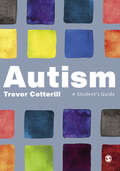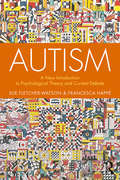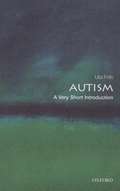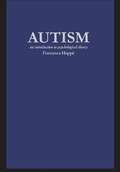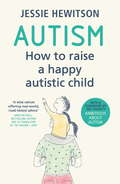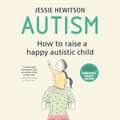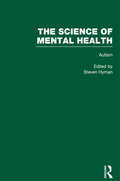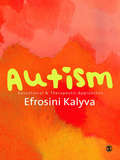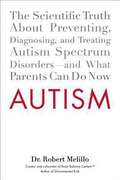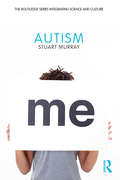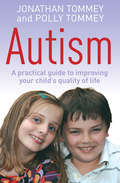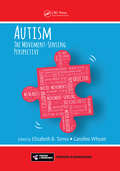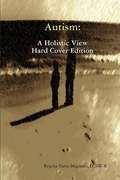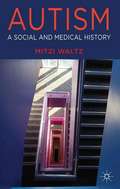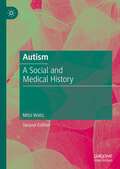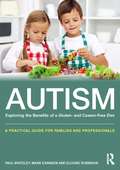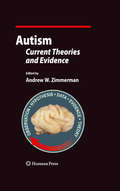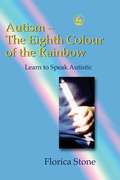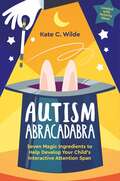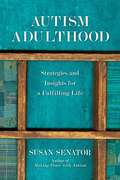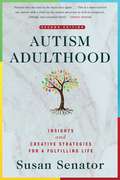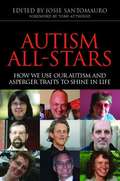- Table View
- List View
Autism: A Student′s Guide
by Trevor CotterillYour critical, evidence-informed and scholarly examination of some of the key issues and debates surrounding Autism. As a student you need to have a strong grounding in Autism, but also engage in the key debates that are happening now. This book will not only not only provide you with a robust foundation but will offer you strategies to use your critical thinking by outlining and engaging with crucial discussions. Each chapter focuses upon an area related to Autism, including ethical and social arguments, transitions, international perspectives and strategies when working with autistic children, people and adults. Key features include: · Case studies of individual and collective experiences of individuals who are living with Autism and those associated with them · Exercises that encourage you to engage with key debates and research · Pauses for reflection to help you assess your own understanding · Key research that will provide you with a better critical knowledge Trevor Cotterill is Programme Leader of the BA (Hons) SEND at the University of Derby.
Autism: A Student′s Guide
by Trevor CotterillYour critical, evidence-informed and scholarly examination of some of the key issues and debates surrounding Autism. As a student you need to have a strong grounding in Autism, but also engage in the key debates that are happening now. This book will not only not only provide you with a robust foundation but will offer you strategies to use your critical thinking by outlining and engaging with crucial discussions. Each chapter focuses upon an area related to Autism, including ethical and social arguments, transitions, international perspectives and strategies when working with autistic children, people and adults. Key features include: · Case studies of individual and collective experiences of individuals who are living with Autism and those associated with them · Exercises that encourage you to engage with key debates and research · Pauses for reflection to help you assess your own understanding · Key research that will provide you with a better critical knowledge Trevor Cotterill is Programme Leader of the BA (Hons) SEND at the University of Derby.
Autism: A New Introduction to Psychological Theory and Current Debate
by Sue Fletcher-Watson Francesca HappéBased on Francesca Happé’s best-selling textbook, Autism: An Introduction to Psychological Theory, this completely new edition provides a concise overview of contemporary psychological theories about autism. Fletcher-Watson and Happé explore the relationship between theories of autism at psychological (cognitive), biological and behavioural levels, and consider their clinical and educational impact. The authors summarise what is known about the biology and behavioural features of autism, and provide concise but comprehensive accounts of all influential psychological models including ‘Theory of Mind’ (ToM) models, early social development models and alternative information processing models such as ‘weak central coherence’ theory. The book also discusses more recent attempts to understand autism, including the ‘Double Empathy Problem’ and Bayesian theories. In each case, the authors describe the theory, review the evidence and provide critical analysis of its value and impact. Recognising the multiplicity of theoretical views, and rapidly changing nature of autism research, each chapter considers current debates and major questions that remain for the future. Importantly, the book includes the voices of autistic people, including parents and practitioners, who were asked to provide commentaries on each chapter, helping to contextualise theory and research evidence with accounts of real-life experience. The book embraces neurodiversity whilst recognising the real needs of autistic people and their families. Thus Autism: A New Introduction to Psychological Theory and Current Debate provides the reader with a critical overview of psychological theory but also embeds this within community perspectives, making it a relevant and progressive contribution to understanding autism, and essential reading for students and practitioners across educational, clinical and social settings.
Autism: A Very Short Introduction
by Uta Frith"What is autism and Asperger syndrome? What are the core symptoms, and what causes them? How early can autism be recognised and what can be done? Why does autism seem to be more and more common? Are we all a little bit autistic?" "This Very Short Introduction offers a clear statement on what is currently known about autism and Asperger syndrome. Looking at symptoms from the full spectrum of autistic disorders, and evaluating current evidence from neuroscience and genetics, this authoritative and accessible book explores the source and nature of social impairment and exceptional talent. Autism: A Very Short Introduction gives a glimpse of life seen through the eyes of autism."--BOOK JACKET.
Autism: An Introduction to Psychological Theory
by Francesca Happe Sue Fletcher-WatsonThis title is intended for advanced undergraduate and masters level students in psychology; professional clinical, developmental and educational psychologists; general practitioners and others with a special interest in children; careworkers; and parents of autistic children.
Autism: How to raise a happy autistic child
by Jessie Hewitson'A wise SatNav for what is often a bewildering, or even scary, zone of parenting. The book offers real-world, road-tested, child-first and family-friendly advice; while also highlighting the twin truths that autism is not a tragedy, and that adaptation and acceptance are not resignation' David Mitchell, bestselling author and co-translator of The Reason I Jump'A must-read for anyone with an autistic child in their life' Laura James, author of Odd Girl OutWritten by Jessie Hewitson, an award-winning journalist at The Times, Autism is the book she wishes she had read when her son was first given the diagnosis of autism spectrum disorder.It combines her own experiences with tips from autistic adults, other parents - including author David Mitchell - as well as advice from autism professionals and academics such as Professor Simon Baron-Cohen. Autism looks at the condition as a difference rather than a disorder and includes guidance on:· What to do if you think your child is autistic · How to understand and support your child at school and at home · Mental health and autism · The differences between autistic girls and boys'It is incredibly useful and informative, full of new research and interviews that put right an awful lot of misinformation. I cannot recommend this highly enough' The Sun'Exceptionally useful and informative' Uta Frith, Emeritus Professor of Cognitive Development, UCL
Autism: How to raise a happy autistic child
by Jessie Hewitson'A wise SatNav for what is often a bewildering, or even scary, zone of parenting. The book offers real-world, road-tested, child-first and family-friendly advice; while also highlighting the twin truths that autism is not a tragedy, and that adaptation and acceptance are not resignation' David Mitchell, bestselling author and co-translator of The Reason I Jump'A must-read for anyone with an autistic child in their life' Laura James, author of Odd Girl OutWritten by Jessie Hewitson, an award-winning journalist at The Times, Autism is the book she wishes she had read when her son was first given the diagnosis of autism spectrum disorder.It combines her own experiences with tips from autistic adults, other parents - including author David Mitchell - as well as advice from autism professionals and academics such as Professor Simon Baron-Cohen. Autism looks at the condition as a difference rather than a disorder and includes guidance on:· What to do if you think your child is autistic · How to understand and support your child at school and at home · Mental health and autism · The differences between autistic girls and boys'It is incredibly useful and informative, full of new research and interviews that put right an awful lot of misinformation. I cannot recommend this highly enough' The Sun'Exceptionally useful and informative' Uta Frith, Emeritus Professor of Cognitive Development, UCL
Autism: How to raise a happy autistic child
by Jessie Hewitson'A wise SatNav for what is often a bewildering, or even scary, zone of parenting. The book offers real-world, road-tested, child-first and family-friendly advice; while also highlighting the twin truths that autism is not a tragedy, and that adaptation and acceptance are not resignation' David Mitchell, bestselling author and co-translator of The Reason I Jump'A must-read for anyone with an autistic child in their life' Laura James, author of Odd Girl OutThe definitive guide for parents of autisic children, written from the perspective of neurodiversity. Written by Jessie Hewitson, an award-winning journalist at The Times, Autism is the book she wishes she had read when her son was first given the diagnosis of autism spectrum disorder.It combines her own experiences with tips from autistic adults, other parents - including author David Mitchell - as well as advice from autism professionals and academics such as Professor Simon Baron-Cohen. Autism looks at the condition as a difference rather than a disorder and includes guidance on:· What to do if you think your child is autistic · How to understand and support your child at school and at home · Mental health and autism · The differences between autistic girls and boys'Jessie Hewitson has really hit the mark with this book, giving our history, our diversity, our challenges and our hopes. Autistic people and their families are finally represented' Carrie Grant'Exceptionally useful and informative' Uta Frith, Emeritus Professor of Cognitive Development, UCLRead by Lucy Scott(p) Orion Publishing Group 2018
Autism: The Science of Mental Health (The Science of Mental Health #2)
by Steven HymanThe Science of Mental Health: Volume 2: Autism by Steven Hyman
Autism: Educational and Therapeutic Approaches
by Efrosini KalyvaThere are a number of different approaches and therapies available for children, young people and adults on the autistic spectrum, and the amount of information available on each one can be daunting for professionals and parents alike. This book offers concise and clear explanations of a variety of proposed interventions and their effectiveness, and helps the reader to decide on the most appropriate treatment for each individual. Efrosini Kalyva writes accessibly about recent scientific evidence and the latest research, and allows you to consider the pros and cons of each approach. She focuses on the following areas: - cognitive-behavioural approaches - developing social interaction - alternative communication strategies - developing play - sensory-motor approaches - psychotherapeutic approaches - biochemical approaches This much-needed guide for practitioners and student teachers will also appeal to interested parents, and to anyone looking for a comparative examination of the variety of treatments on offer.
Autism
by Dr Robert MelilloFrom the bestselling author of Disconnected Kids, a clear and compassionate explanation of the causes of the autism epidemic--and a scientifically based approach for prevention and treatment. As he travels the country helping parents and children cope with neurological disorders, Dr. Robert Melillo is always asked one question: Why? Why are autism rates exploding? But an equally important question always follows: What can we do about it as a society--and what can I do to help my child? In this candid, research-based, practical book, Dr. Melillo presents the latest scientific explanation for how we got here and proven, drug-free strategies that parents can employ to help prevent, detect, and address the autism epidemic for themselves and their families. With honesty and compassion, Dr. Melillo explains what the latest scientific research tells us about the role of genetic, environmental, and lifestyle factors, dispelling myths and replacing them with the facts. In addition, he presents early warning signs, a prevention plan for parents-to-be, and an intervention program for babies and young children.
Autism: Culture, Narrative, Fascination (Representations: Health, Disability, Culture And Society Ser.)
by Stuart MurrayAutism is the first book on the condition that seeks to combine medical, historical and cultural approaches to an understanding of the condition. Its purpose is to present a rounded portrayal of the ways in which autism is currently represented in the world, It focuses on three broad areas: the facts of scientific research, including new ideas surrounding research into genetics and neuroscience, as well as the details of diagnosis and therapy; the history of the condition as it developed through psychiatric approaches to the rise of parent associations, neurodiversity and autism advocacy; and the fictional and media narratives through which it is increasingly expressed in the contemporary moment. Accessible and written in clear English, Autism is designed for student audiences in English, Disability Studies, Cultural Studies, History, Sociology, and Medicine and Health, as well as medical practitioners and the general reader. Autism is a condition surrounded by misunderstanding and often defined by contestation and argument. The purpose of this book is to bring clarity to the subject of autism across the full range of its manifestations.
Autism: A Practical Guide to Improving Your Child's Quality of Life
by Polly Tommey Jon TommeyThis book shares the authors' personal experience of bringing up their autistic son who at age 13 is now described as high functioning (from an early diagnosis of severe autism). It also draws on the latest research and expert opinion from around the world. The book will give parents and carers the confidence and knowledge they need to tackle the problems and issues they face. There is much that can be done to improve the quality of an autistic child's life. The book shares Jon's experience with some of the children he has treated who have done so well that they can be considered recovered. The book includes: advice for the first year of a child's life; the facts and risks of vaccination; diagnosis and the impact on a family; a look at the therapies available and why different ones will suit different children; the importance of diet and how to alleviate the debilitating gut problems experienced by most children; advice on education and schooling; how to cope as a family and a couple; dealing with difficult issues such as puberty; and thinking about the longterm future for your child. Strong resources section included.
Autism: A practical guide to improving your child's quality of life
by Polly Tommey Jon TommeyThis book shares the authors' personal experience of bringing up their autistic son who at age 13 is now described as high functioning (from an early diagnosis of severe autism). It also draws on the latest research and expert opinion from around the world. The book will give parents and carers the confidence and knowledge they need to tackle the problems and issues they face. There is much that can be done to improve the quality of an autistic child's life. The book shares Jon's experience with some of the children he has treated who have done so well that they can be considered recovered. The book includes: advice for the first year of a child's life; the facts and risks of vaccination; diagnosis and the impact on a family; a look at the therapies available and why different ones will suit different children; the importance of diet and how to alleviate the debilitating gut problems experienced by most children; advice on education and schooling; how to cope as a family and a couple; dealing with difficult issues such as puberty; and thinking about the longterm future for your child. Strong resources section included.
Autism: The Movement Sensing Perspective (Foundations and Innovations in Neurobiology)
by Elizabeth B. Torres Caroline WhyattAutism: The Movement Sensing Perspective is the result of a collaborative effort by parents, therapists, clinicians, and researchers from all disciplines in science including physics, engineering, and applied mathematics. This book poses questions regarding the current conceptualization and approach to the study of autism, providing an alternative unifying data-driven framework grounded in physiological factors. This book reaches beyond subjective descriptions of autistic phenomena and embraces a new era of objective measurements, analyses, and statistical inferences. The authors harness activities from the nervous systems across the brain and body (often in tandem), and introduce a platform for the comprehensive personalized phenotyping of individuals with autism. The impact of this approach is discussed to advance the development of tailored treatments options, enhance the ability to longitudinally track symptomatology, and to fundamentally empower affected individuals and their families. This book encompasses a new era for autism research and treatments, and our continuous effort to collectively empower and embrace the autistic community.
Autism: A Holistic View
by Regina Varin-MignanoMuch of the recent research in autism comes from a quantitative, researcher's viewpoint. However, this book's mission is to look at the "whole picture" in order to capture the meaning of Autism and its effects on the family. The book is written primarily for social work professionals in the field of autism and developmental disabilities, Students, individuals affected with Autism Spectrum Disorders and their families alike, and anyone who has a special interest in the ASD field. In order to capture the impact of autism, the autor utilizes her own personal and professional experience in identifying the different aspects that make up the culture of autism: its history, the biological and environmental aspects; past and present governmental and educational policies; the social impact of autism and its impact on the family unit.
Autism
by Mitzi WaltzThis book contextualizes autism as a socio cultural phenomenon, and examines the often troubling effects of representations and social trends. Exploring the individuals and events in the history of this condition, Waltz blends research and personal perspectives to examine social narratives of normalcy, disability and difference.
Autism: A Social and Medical History
by Mitzi WaltzThis expanded second edition of Mitzi Waltz’s Autism: A Social and Medical History offers an in-depth examination of how the condition was perceived before it became a separate area of investigation, and how autism has been conceptualised and treated since. As well as strengthening the existing text, Waltz has added material on a number of topics that have received increased attention since the first edition, including the rise of the anti-vaccination movement, the shift towards genetic and genomic research, and the progress of the autism self-advocacy movement. The author examines these issues through the perspective of what they mean for autistic people, clinicians and society, and looks at the challenges still faced by autistic people. Waltz also looks at the increased autism diagnosis among girls and women, and how autism has been represented in traditional media and social media. The book includes information from interviews with key researchers, parents of autistic children and people with autism.
Autism: A practical guide for families and professionals
by Paul Whiteley Mark Earnden Elouise RobinsonAutism represents one of the biggest health challenges facing children today. Whilst experts around the globe strive to unravel and truly understand how autism develops and presents itself, relatively little is still known about the condition. Meanwhile, strong evidence has emerged that the diet in children on the autistic spectrum can have a significant role to play in the management of their symptoms. A growing body of research reveals that some challenging characteristics present in autism may be positively affected by the introduction of a gluten- and casein-free (GFCF) diet. Autism: Exploring the benefits of a gluten and casein free diet offers an easy-to-read alternative to sifting through the science. Written by experts in autism research, food, nutrition and dietetics, the book cuts through the science-speak to offer readers a no-nonsense overview of diet and autism together with a range of useful recipes and handy hints for making mealtimes fun for children with autism and related conditions.
Autism: Current Theories and Evidence (Current Clinical Neurology)
by Andrew W. ZimmermanCreative thinking and collaborative scientific research have advanced our understanding of autism, and we are now beginning to synthesize the data into evidence and theories. Autism: Current Theories and Evidence presents current theories about autism and the evidence that supports them. The goal is to show how the scientific method is revealing the biological bases of this spectrum of disorders, thereby leading the way to their treatment and prevention using evidence-based medicine. This book has 20 chapters divided into 6 sections: Molecular and Clinical Genetics; Neurotransmitters and Cell Signaling; Endocrinology, Growth and Metabolism; Immunology, Maternal-Fetal Effects and Neuroinflammation; Neuroanatomy, Imaging and Neural networks; and Environmental Mechanisms and Models. The subjects cover a wide range of current scientific work in the field of autism, with strong and growing evidence to support them, and demonstrate both the breadth and depth of current autism research. The reader is encouraged to consider how theories and the scientific method, in the hands of these and other dedicated researchers, are leading to greater knowledge and continued progress in autism research.
Autism – The Eighth Colour of the Rainbow: Learn to Speak Autistic
by Florica StoneThrough her questioning of traditional approaches regarding autism, and with determination and patience, Florica Stone has been able to develop a satisfying and supportive two-way channel of communication with her once non-verbal and solitary autistic son. In Autism â?? The Eighth Colour of the Rainbow Florica shows how shared meanings can be learnt and expressed between autistic and non-autistic individuals, though they experience radically different perceptions of reality. Through interacting with and listening to her autistic friends and son, she began to understand the autistic learning style and to decipher the various behavioural needs that arise from their particular sensory processing. In this inspiring, much-needed guide she presents ways of creating autistic-friendly environments, modifying traditional responses to autistic behaviour and using literal learning, and provides many useful examples and exercises. This book will help parents, teachers and professionals to learn how to interact meaningfully with autistic children, continuously enhance communication and bring about long-lasting changes.
Autism Abracadabra: Seven Magic Ingredients to Help Develop Your Child’s Interactive Attention Span
by Kate WildeDon't you wish there was a "magic" formula for activities and games that...- Your loved one on the autism spectrum actually wants to participate in? - Develops their interactive attention span and socialization? There is! Designed around common special interests enjoyed by autistic people, this book includes over 180 activities for families to do together to help strengthen relationships and develop social skills. Kate shows how seven magic ingredients for optimal game-playing can be applied to a range of themes, from trains and planes to household appliances, the human body to animals and insects, TV and film characters, and what's more, how you can introduce your loved one's favorite topics. She shares "Presto Chango" beliefs - the five mindsets you need to power activities - as well as how to understand the magic of timing and knowing when to start and stop an activity based on your loved one's cues.
Autism Adulthood: Strategies and Insights for a Fulfilling Life
by John Elder Robison Susan SenatorOne of the biggest fears of parents with children with autism is looming adulthood and all that it entails. In her new book Susan Senator takes the mystery out of adult life on the autism spectrum and conveys the positive message that even though autism adulthood is complicated and challenging, there are many ways to make it manageable and enjoyable. From her own son with autism, now twenty-five, she has learned ?never say never.”Autism Adulthood features thirty interviews with autistic adults, their parents, caregivers, researchers, and professionals. Each vignette reveals firsthand a family’s challenge, their circumstances, their thought processes, and their unique solutions and plans of action. Sharing the wisdom that emerges from parents’ and self-advocates’ experiences, Senator adds her own observations and conclusions based on her long-term experience with autism. Told in Senator’s trademark warm, honest, and approachable style, Autism Adulthood paints a vivid and thought-provoking picture of many people grappling with grown-up, real-life autism. Senator’s is the only book of its kind, as real families share their stories and their creative solutions.
Autism Adulthood: Insights and Creative Strategies for a Fulfilling Life—Second Edition
by Susan SenatorOne of the biggest fears of parents with children with autism is their looming adulthood and all that it entails. In this Second Edition of her lauded book Autism Adulthood, Susan Senator further tackles the challenges of adult life on the autism spectrum on the more severe end of the spectrum – those who cannot communicate for themselves, honestly discussing the complex decisions that await all parents and caregivers. To help parents find the guidance they need to provide fruitful lives for their autistic loved ones’ and the support they themselves need, Senator shares her own family’s personal story about her son, Nat, and his struggles and triumphs as an adult with severe autism. Autism Adulthood features interviews with parents, caregivers, researchers, and professionals. Each vignette reveals firsthand a family’s needs and goals—the circumstances, thought processes, and unique solutions. Sharing the wisdom that emerges from parents’ and self-advocates’ experiences, Senator adds her own observations and conclusions based on her long-term familiarity and understanding of autism. Told in Senator’s trademark warm, approachable style, Autism Adulthood, Second Edition paints a vivid and thought-provoking picture of many people grappling with grown-up, real-life autism. Senator’s is the only book of its kind, as real families share their stories and their creative solutions.
Autism All-Stars: How We Use Our Autism and Asperger Traits to Shine in Life
by Damian Santomauro William Hadcroft Josie Santomauro Jessica Peers Malcolm Johnson Tony Attwood Stephen Shore Deborah Lipsky Sondra Williams Jeanette Purkis Leith Mcmurray Temple Grandin Peter Myers Robert Mclachlan Colin Webber Iain Payne Wendy Lawson Roger Meyer Mark Mark Boerebach Donna Williams Stan HoodLooking at the positive influences, great talents and unique thought processes of individuals with Autism Spectrum Disorders, this book is a celebration of those who have used their autism to shine in life. Writers from all over the world at different stages in their careers, and from very different backgrounds, share their experiences of creating a successful life on the autism spectrum. Each explains how it is possible to draw on autistic strengths not just to make your way in the world, overcoming challenges and obstacles, but also to make your life a real success. Education, the world of work, and relationships are the focus of the first part of the book, which then goes on to look at exceptional creativity, and the use of special interests. The autobiographical stories in this book are full of wisdom and humour, and will be an inspiration for anyone with high-functioning autism or Asperger Syndrome, their family and friends, and the professionals who work alongside them.
